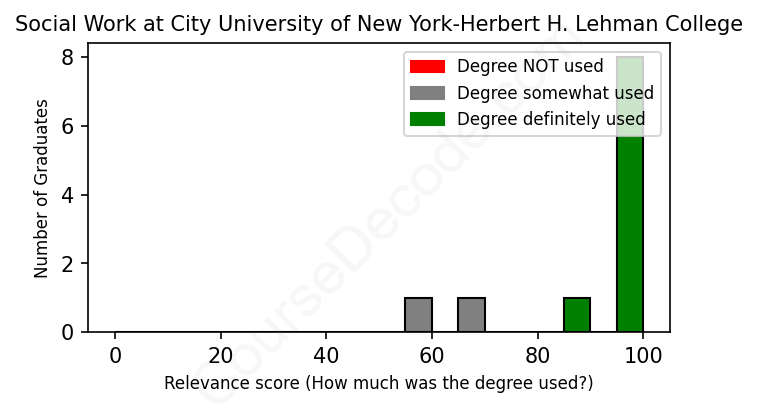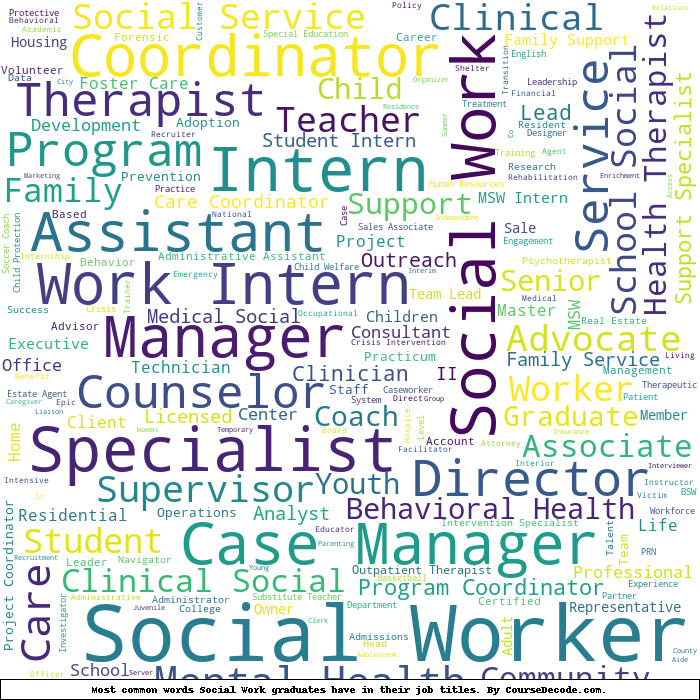
First, some facts. Of the Social Work graduates from City University of New York-Herbert H. Lehman College we've analyzed , here's how many have used (or NOT used) their degree in their career:

These are estimates based on AI analysis of 11 LinkedIn profiles (see below).
The verdict? Great! Overall, with an average relevance score of 91%, Social Work graduates from City University of New York-Herbert H. Lehman College have a substantially higher likelihood (+24%) of finding work in this field compared to the average graduate across all fields:
And for comparison, here's the chart for all profiles we've looked at across all degrees.
Also, after graduating, 81% of these graduates have pursued further education other than another Bachelor's degree (such as a Masters degree or other), compared to the average across all profiles of 35%. This suggests you may need more than just a Bachelors degree to be competitive as a Social Work graduate.
See the details:
|
Relevance score: 100% We think this person has gone into a career highly relevant to their degree. We think this person has gone into a career highly relevant to their degree.
DEGREE INFOGraduated in 2017 from City University of New York-Herbert H. Lehman College with a Bachelor of Social Work in Social Work. Also pursued further education since (see below). JOB HISTORY SINCE GRADUATIONProgram Assistant The Ali Forney Center Mar 2018 - Present Social Worker Intern  The Ali Forney Center Mar 2018 - Present FURTHER DEGREES DONE SINCE GRADUATINGMaster of Social Work - MSWAdelphi University 2017 - 2018 ABOUTI am pleased to share my credentials for review for this position. I was a Media Educator Apprentice as well as a Media Educator, a Social Work Intern, and currently a Program Assistant. I will bring an understanding of the responsibilities of this position as well as my experience working with young people, individuals with mental health issues, LGBTQ youths, and the homeless population. Being a competent individual who possesses excellent interpersonal skills, I am also an experienced facilitator and presenter who has a passion for media, youth advocacy and youth development. I have experience working in a therapeutic setting with youth in the LGBTQ homeless population and as well as the mental health setting with patient with substance abuse problem and mental health illness, meeting with them once a week to talk about their feeling and goals. Having worked in an environment that is big on teamwork, we had monthly team meetings with the young person to discuss their accomplishments. I assisted with the client's assessment upon entry into the program, data entry, assessing their needs and goals for their time in the program. |
The top 10 most common jobs done by the graduates we've analyzed (ranked most common to least) are:
When looking at jobs held by graduates from the Social Work program at CUNY-Herbert H. Lehman College, it's clear that many of them went into roles that are directly tied to social work principles. A bunch of them worked as case managers or support coordinators, which involved helping clients assess their needs and find the right resources. These positions, like Case Manager at Bronx Jewish Community Council or Support Coordinator at ShiftNJ, are deeply related to the skills they learned in school. There's also a trend of graduates moving into roles as school social workers or counselors, where they apply their training in a setting focused on guiding and supporting students, which is super relevant too.
However, not all roles are as closely aligned with social work. Some graduates took on positions like Certification Specialist or Customer Care Representative, where the focus is more on administrative tasks or client interactions that don’t really tap into their specialized knowledge. While they might still utilize some soft skills from social work, these jobs lack that deeper involvement with clients or specific social work methods. Overall, while many graduates have found roles that leverage their education effectively, there are definitely some outliers where the connection isn't as strong. It's a mixed bag, but a lot of them are making solid use of their social work degrees in meaningful ways!
Here is a visual representation of the most common words in job titles for Social Work graduates (this is across all Social Work graduates we've analyzed, not just those who went to City University of New York-Herbert H. Lehman College):

Graduates from the Social Work program at City University of New York-Herbert H. Lehman College tend to follow a fairly solid trajectory in their careers, often starting with entry-level roles that are directly relatable to their studies. For many, their first job is usually something like a case manager or a support coordinator, where they are able to gain practical experience working with individuals or families in need. A lot of these initial positions seem to be located in community services or nonprofit organizations, which is a great way to kick off a career in social work.
As these graduates hit the five-year mark, many tend to move up into more specialized or supervisory roles like clinical coordinators, program directors, or school social workers. This upward mobility indicates that people are effectively leveraging their early experiences to build their careers. By the ten-year mark, we see many individuals holding significant positions such as clinical supervisors or even program managers in established organizations. While not every graduate stays strictly within the realm of social work—some veer off into related fields like compliance or program management—it's clear that a good number of them are navigating successful, relevant careers that utilize their social work education. Overall, it seems like many graduates find successful and fulfilling careers in this field, which is pretty encouraging if you're considering a social work path yourself!
Getting a Bachelor’s degree in Social Work at Herbert H. Lehman College can be a decent challenge, but it’s not overly intense compared to some other majors. You’ll dive into subjects like human behavior, community organization, and social policy, which can be really interesting but also require a lot of reading and some critical thinking. The coursework usually emphasizes practical experience, so you might find yourself doing internships or fieldwork, which can be demanding but totally rewarding. Overall, it’s a bit easier than some science or engineering degrees, but it does require a solid commitment and a genuine passion for helping others. Just be prepared to balance your studies with real-world experiences, and you'll be fine!
Most commonly, in the LinkedIn profiles we've looked at, it takes people 2 years to finish a Bachelor degree in Social Work.
So, looking at these social work grads from Lehman College, it seems like they're doing decent but not exactly rolling in cash. Many of them started out with roles like case managers and support coordinators, which typically don’t pay super well—think more in the low to mid-40s, maybe a bit higher if they’ve got experience. A couple of them have moved up to program director and clinical supervisor roles, which can definitely boost their salaries, potentially reaching the 60s or even 70s. Overall, it looks like they’ve got stable jobs making a reasonable living, but they’re not exactly in high-income brackets that would allow for a lavish lifestyle. It’s a tough field, but hey, it’s all about making a difference, right?
Here is a visual representation of the most common words seen in the "about" section of LinkedIn profiles who have a Bachelor degree in Social Work (this is across all Social Work graduates we've analyzed, not just those who went to City University of New York-Herbert H. Lehman College). This may or may not be useful:

Here are all colleges offering a Bachelor degree in Social Work (ordered by the average relevance score of their Social Work graduates, best to worst) where we have analyzed at least 10 of their graduates: